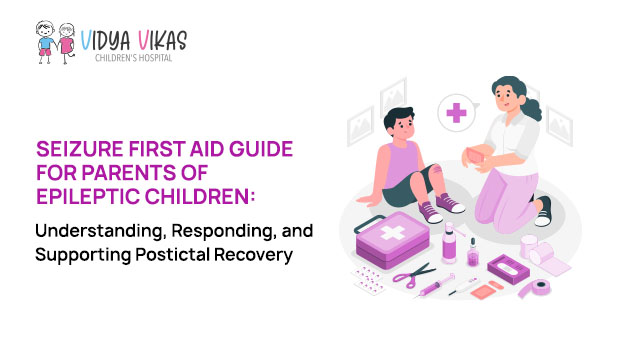


Experiencing seizures can be a daunting situation, especially when it involves children. As a parent or caregiver, it is crucial to be well-informed about what to do during a seizure to ensure the safety and well-being of the child. Seizures typically occur suddenly, and their duration and severity can vary. Whether it happens once or repeatedly, a single seizure or recurrent episodes may lead to epilepsy or a seizure disorder.
Witnessing your child having a seizure can be alarming, but staying calm is essential. During a seizure, it’s crucial to follow these steps:
Ensure Safety: Move any nearby objects that could cause harm during the Seizure.
Time the Seizure: Note the start time of the Seizure to determine its duration, as seizures lasting longer than five minutes may require emergency medical attention.
Protect the Head: Gently place your child on the floor, turning them onto their side to prevent choking. Place a soft object or your hands under their head for protection.
Clear the Area: Create a safe space by removing sharp or dangerous objects to prevent injury.
Do Not Restrain: Avoid holding down or restraining your child’s movements. Allow the seizure to run its course.
Stay Calm and Reassure: Speak calmly and reassuringly to your child. They may be confused or frightened after the Seizure, so offer comfort.
Do’s:
Don’ts:
The postictal period is the time immediately following a seizure. It’s essential to provide appropriate care during this phase:
Seizures can have various causes, and while some may be preventable, others may not. Consult a healthcare professional to identify potential triggers and develop a management plan.
2. How do I explain seizures to my child’s friends and teachers?
Open communication is key. Provide basic information about seizures, what to expect, and how they can support your child during an episode.
3. Are all seizures the same?
No, seizures can manifest differently. They may involve different parts of the brain, resulting in various symptoms. Seek guidance from a neurologist to understand your child’s specific condition.
4. Should my child be on medication for seizures?
Depending on the underlying cause and the severity of the seizures, a pediatric neurologist can evaluate your child’s condition and recommend an appropriate treatment plan.
5. Should my child be restricted in sports?
It’s natural for parents to wonder about the safety of their child participating in sports and physical activities. In many instances, children with well-controlled seizures can engage in sports. However, it is crucial to have a discussion with your child’s healthcare team to ensure that necessary precautions are taken (especially for swimming and horse riding)
In conclusion, being well-versed in seizure first aid for children is imperative for parents and caregivers. By following the correct procedures during a seizure, providing adequate postictal care, and seeking professional advice, you can actively contribute to your child’s health and well-being. If you are searching for the best pediatric neurologist in India, consider consulting with specialists like Dr. Nikhil Pawar, a renowned seizure specialist in the country. Always consult with healthcare professionals for personalized advice and assistance tailored to your child’s unique needs.